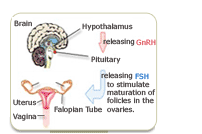34 MENOPAUSE SYMPTOMS |
HEALTH CENTER |
|
| |
|
|
|
|
Risk factors for Loss of Libido |
|
|
|
|
Menopausal women experiencing declining estrogen and testosterone levels will be more sensitive to other factors that may trigger loss of libido, such as stress, medical conditions, or depression. Keep reading to learn about the most common risk factors for loss of libido, and the best options for treatment. |
|
|
Several physical and psychological conditions can contribute to loss of libido, especially in women going through the hormonal changes described on the preceding page.
|
A major risk factor for loss of libido is surgical menopause (removal of ovaries and/or uterus). After oophorectomy (removal of ovaries) testosterone immediately fall to 50% of pre-surgery levels, while removal of the uterus will affect the vagina's relation to surrounding organs, changing how sexual intercourse feels for both the woman and her partner.
The following list cites the other most common triggers of loss of libido. |
|
|
- Diabetes
- Heart disease
- Neurological conditions
- Pelvic surgery/trauma
- Secondary effects of medications
- Chronic diseases (such as kidney or liver failure)
- Alcoholism/drug abuse
- Smoking
|
|
- Stress
- Anxiety about sexual performance
- Marital problems
- Depression
- History of sexual trauma
- Loss of income/emotional stress
- Tension between partners
|
|
|
| |
|

|
|
Testosterone Patch may Alleviate Low Libido |
|
Loss of libido in women is often linked to decreased levels of testosterone hormones. The ovaries and adrenal glands produce 50% of testosterone, but during menopause this production decreases dramatically, leading to reduced sexual activity and desire in menopausal women. |
|
|
| |
| |
| |
|
|
|
Menopause does not have to signal the end of healthy sexual activity. A range of treatment options are available for women who want to regain the healthy libido they had before menopause. To learn about the most effective treatment solutions for loss of libido, click on the following link. 
|
Loss of libido may seem inevitable, but there are different treatment options that can bring relief. Keep reading the section below to learn about the most effective treatments for menopause-related loss of libido, including lifestyle changes, alternative treatments, and medical procedures. |
|
|
|
|
Treatment for Loss of Libido
with MacaActive Supplements |
|
As you have already read, loss of libido are mainly caused by declining estrogen levels, which is a natural part of aging. Therefore, if you want relief from this undesirable symptom, you must restore estrogen hormone levels.
Today there are three effective ways to normalize hormonal levels: lifestyle changes, alternative medicine and drugs & surgery.
|
|
 |
Lifestyle Changes: This level of treatment involves no risk, but may be the hardest way to go because you'll have to restrict yourself from many things. That's why most people consider the next level of treatment, alternative medicine, which has proven to be excellent for treating loss of libido in a safe and natural way.
|
|
 |
Alternative medicine: There are two types of herbal supplements for treating loss of libido: Those containing phytoestrogenic herbs, and those containing non-estrogenic herbs. Phytoestrogenic herbs (like Black Cohosh) are filled with phytoestrogens, which are similar to estrogens. They can increase low estrogen levels by replacing some of the missing estrogen hormones. This isn't the best solution, however, because your body will become less responsive to producing estrogen on its own, causing a further decrease in body-own hormone levels. Unlike phytoestrogenic herbs, non-estrogenic herbs don't contain estrogen, but nourish hormonal glands to work more efficiently. This ultimately results in balancing not only estrogen, but other necessary hormones, as well. Non-estrogenic herbs are thus one of the best and safest ways to treat loss of libido naturally.
An excellent example of a safe and effective non-estrogenic herb for hormonal imbalance is herbal MacaActive. What makes MacaActive so special is its ability to balance hormonal levels in women by nourishing the hormonal glands. It thus alleviates most disorders related to hormonal imbalance, including loss of libido.  to read more about MacaActive.
|
|
 |
Drugs and Surgery: This level of treatment has the highest risk and often the highest costs. The most common drug therapy for treating loss of libido in the US is hormone replacement therapy (HRT). There's no doubt that this is the quickest and strongest way to combat hormonal imbalance. Unfortunately, it entails serious side effects and increases the risk of different types of cancer in women. If you still want to consider this approach, see your doctor to become better informed about what this treatment option involves.
|
|
A safe way to balance hormones:
Non-estrogenic herbs are the most effective solution for treating hormonal imbalance and its related symptom, loss of libido.
MacaActive is an excellent non-estrogenic herb. It's simple: rather than putting hormones from the outside into your body artificially, MacaActive stimulates your hormone glands into producing the necessary hormones naturally. This is what makes MacaActive supplements so unique.  to read all about MacaActive. |
 |
|
|
|






